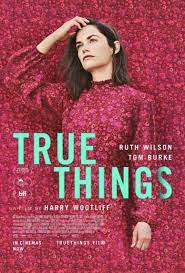
TRUE THINGS
UK, 2021, 102 minutes, Colour.
Ruth Wilson, Tom Burke, Hayley Squires, Elizabeth Rider, Frank McCusker, Ann Firbank.
Directed by Harry Wootliff.
It is not usual to refer to a film, a fiction feature, as a “case-study”. However, it seems helpful to use it here.
As regards the title, there is a glimpse of a text, from a dating agency, during the film which refers to “true things to tell”. And, the novel on which the screenplay is based is actually called “True Things about Me”. So, a film about revelations, and self-revelations.
The me is Kate, mid to late 30s, a complex portrayal of insecurities by Ruth Wilson (whose usual roles are those of strong, even aggressive women). We know little about Kate initially. We see her at work, but soon realise that she is not entirely dependable, is late, act on whims, is threatened by her boss, exasperating her good friend.
Then, suddenly, there is a development. She is very friendly towards a young man, client of the firm, out of prison, a friendly approach. We realise that she is quite susceptible to male charm.
Important for this film as a case study is the visual style of the director and the cinematographer, the use of very frequent close-ups, and extreme close-ups, focusing on Kate, her face, her expressions. And this is reinforced by the style of some of the close-ups, hand-held camera work, leading the audience to a more intimate look at Kate.
The main drama is how she handles this attraction, this relationship with the young man, whom she calls Blond because of his dyed hair (actor Tom Burke, R.B.Galbraith’s Cormorant Strike in the television films of the series). She is comfortable in his presence, despite his sometimes offhand manner, but seemingly genuine protestations of love, even borrowing her car and not returning it for a week, no explanations. He reassures her, and, for a time, she is reassured. However, with a visit to her parents and her outburst against her mother who takes great offence, we realise that Kate is low in self-esteem. And this adds to her insecurities and uncertainties with Blond.
In the language of discernment for making decisions, when she feels desolate, she over indulges superficial cheerfulness, dressing up stylishly and going on a date set up by her friend, drinking, flirting, trying to impose herself on him sexually and his resisting. Her seeming worthlessness is reinforced.
The final act of the film is Blond inviting Kate to a wedding celebration in Spain. She is full of hope. He says the usual things but also acts in his usual casual, offhand way with her. Will she stay? Will she go? How will this all affect her?
This film has no answers. It does suggest some hope. However, we have 90 minutes or so of the close-up portrait of Kate, are invited to speculate about her and her personality, a case-study.
- The title? Others wanting true things about ourselves? The novel title, True Things about Me?
- A British story, universal story? The London settings, offices, homes, restaurants? The exhibition to Spain? The musical score?
- The focus on Kate, the direction and camera style, close-ups, extreme close-ups, hand-held camera focus on Kate, face and expressions? Offering the audience a certain intimacy and knowledge of Kate?
- The film is a case study, portrait of a middle-aged woman, late 30s, the audience not knowing much about her past, encountering her the office, at home, with her parents, friends, the encounter with Blond, the consequences?
- Kate, mid to late 30s, unmarried, living alone, self-image, lacking in self-confidence, lacking in self-awareness? Awkwardness in relationships? The support of her friend at work, wanting to set her up? The callous attitudes, late for work, idling? Reprimands from her boss? The possibility of being fired?
- The visit to her parents, a sympathetic father, her mother urging her on, critical, Kate outburst against her mother? The later visit and trying to help?
- Kate and prospects for life, living alone, relationships? Blond and is coming to the office, cheerful, mentioning his prison background, his hopes, the documents? Pleasant to Kate?
- Blond, his character, the audience really knowing little about him, Kate knowing little about him? His turning up, the outings, his pleasant manner of speaking? The effect on Kate, possibilities for love? Blond affirming her? The outings, the sexual relationship? His mooring her car, keeping it for a week, no information? Her being hurt, reaction, his reassuring her? But his having little regard for her feelings about the car? His continually wanting to make it up to her?
- Kate, her reaction, disconsolate about the relationship with Blond, yet going on the date, the drinking, flirting, covering up her inadequacy, the drive, imposing herself on the date, his refusal, the impact on her self-image, emotions?
- Blond, the invitation to Spain, her hesitation, going, his keeping her waiting at the airport, the accommodation, the party, his being with everyone else, neglecting her?
- Her leaving? The effect of the experience with Blond? Self-awareness, self-image, inadequacies? Or her beginning to make decisions?